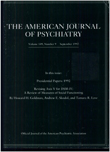Cognitive deficits and psychopathology among former prisoners of war and combat veterans of the Korean conflict
Abstract
OBJECTIVE: This study was conducted to describe the long-term psychological and psychiatric sequelae of prisoner of war (POW) confinement against the backdrop of psychiatric evaluations of Korean conflict repatriates more than 35 years ago. METHOD: A group of 22 POWs and a group of 22 combat veteran survivors of the Korean conflict were compared on measures of problem solving, personality characteristics, mood states, and psychiatric clinical diagnoses by means of a battery of psychometric instruments and structured clinical interviews. RESULTS: Although the two groups were similar in background and personal characteristics, they differed in reports of life adjustment problems, complaints of physical distress, proficiency on cognitive tests, objectively measured personality characteristics, and assigned psychiatric diagnoses. CONCLUSIONS: Illustrated by a case report which describes the prolonged brutality of the Korean conflict POW experience for one individual, the results suggest that the psychiatric symptoms documented more than three decades ago have persisted in severity and chronicity. In addition to problems with cognitive deficits and complaints of bodily discomfort, most common among POW survivors were symptoms of suspiciousness, apprehension, confusion, isolation, detachment, and hostility.
Access content
To read the fulltext, please use one of the options below to sign in or purchase access.- Personal login
- Institutional Login
- Sign in via OpenAthens
- Register for access
-
Please login/register if you wish to pair your device and check access availability.
Not a subscriber?
PsychiatryOnline subscription options offer access to the DSM-5 library, books, journals, CME, and patient resources. This all-in-one virtual library provides psychiatrists and mental health professionals with key resources for diagnosis, treatment, research, and professional development.
Need more help? PsychiatryOnline Customer Service may be reached by emailing [email protected] or by calling 800-368-5777 (in the U.S.) or 703-907-7322 (outside the U.S.).



